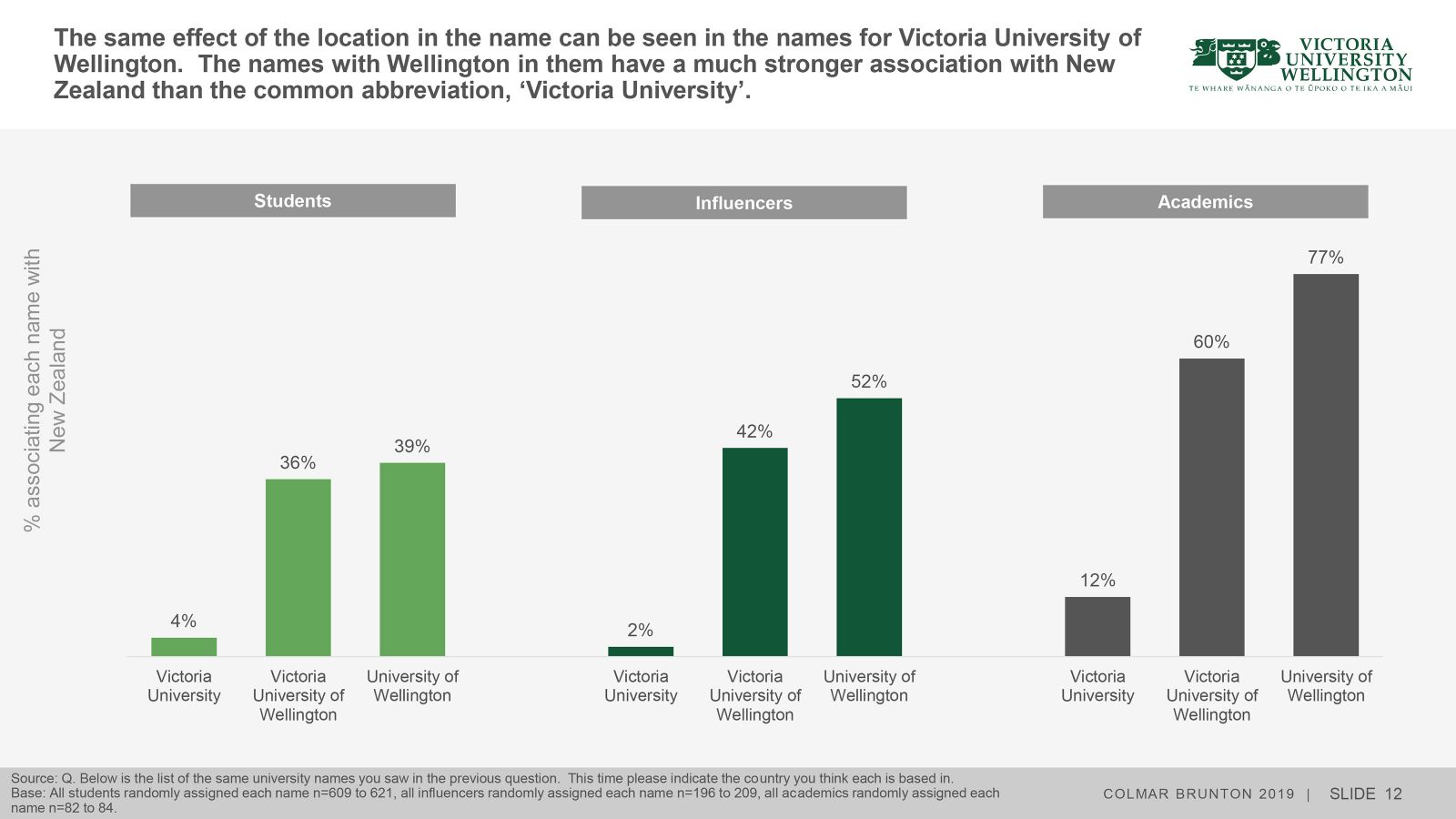Market research
The findings of the latest market research into the performance of our name reinforce the adoption of a visual identity.
The research, undertaken by Colmar Brunton, provides further clear evidence that the commonly-used abbreviations of our name are making it very difficult for us to further enhance our international identity and reputation.
The results show that variations of our name with Wellington in them have a much stronger association with New Zealand than the common abbreviation, ‘Victoria University’.
In stark contrast, few of the people surveyed associated the name ‘Victoria University’ with New Zealand—with many more respondents thinking it was associated with Australia rather than New Zealand.
The two graphs below—slide 12 and 13 of the full document—provide figures that support these points. The graphs show the how different versions of the University’s name are associated with New Zealand and other countries, among students, influencers, and academics.

View gallery
Graph information—slide 12
Percentage of students associating each name with New Zealand
| Victoria University | 4% |
| Victoria University of Wellington | 36% |
| University of Wellington | 39% |
Percentage of influencers associating each name with New Zealand
Victoria University | 2% |
Victoria University of Wellington | 42% |
University of Wellington | 52% |
Percentage of academics associating each name with New Zealand
Victoria University | 12% |
Victoria University of Wellington | 60% |
University of Wellington | 77% |
Source: Q. Below is the list of the same university names you saw in the previous question. This time please indicate the country you think each is based in.
Base: All students randomly assigned each name n=609 to 621, all influencers randomly assigned each name n=196 to 209, all academics randomly assigned each name n=82 to 84.
Graph information—slide 13
Percentage of students associating each name with each country
New Zealand | Australia | Canada | Other country | No single country | Don’t know | |
Victoria University | 4% | 40% | 9% | 41% | 1% | 6% |
Victoria University of Wellington | 36% | 10% | 2% | 44% | 1% | 8% |
University of Wellington | 39% | 6% | 1% | 46% | 1% | 8% |
Percentage of influencers associating each name with each country
New Zealand | Australia | Canada | Other country | No single country | Don’t know | |
Victoria University | 2% | 39% | 12% | 38% | 1% | 9% |
Victoria University of Wellington | 42% | 12% | 3% | 37% | 1% | 6% |
University of Wellington | 52% | 11% | 1% | 32% | 5% |
Percentage of academics associating each name with each country
New Zealand | Australia | Canada | Other country | No single country | Don’t know | |
Victoria University | 12% | 46% | 18% | 9% | 4% | 11% |
Victoria University of Wellington | 60% | 12% | 10% | 14% | 1% | 2% |
University of Wellington | 77% | 2% | 1% | 12% | 7% |
The figures may not add to 100 percent due to rounding.
Source: Q. Below is the list of the same university names you saw in the previous question. This time please indicate the country you think each is based in.
Base: All students randomly assigned each name n=609 to 621, all influencers randomly assigned each name n=196 to 209, all academics randomly assigned each name n=82 to 84.
Full document
The full findings of the Colmar Brunton research are available here:
